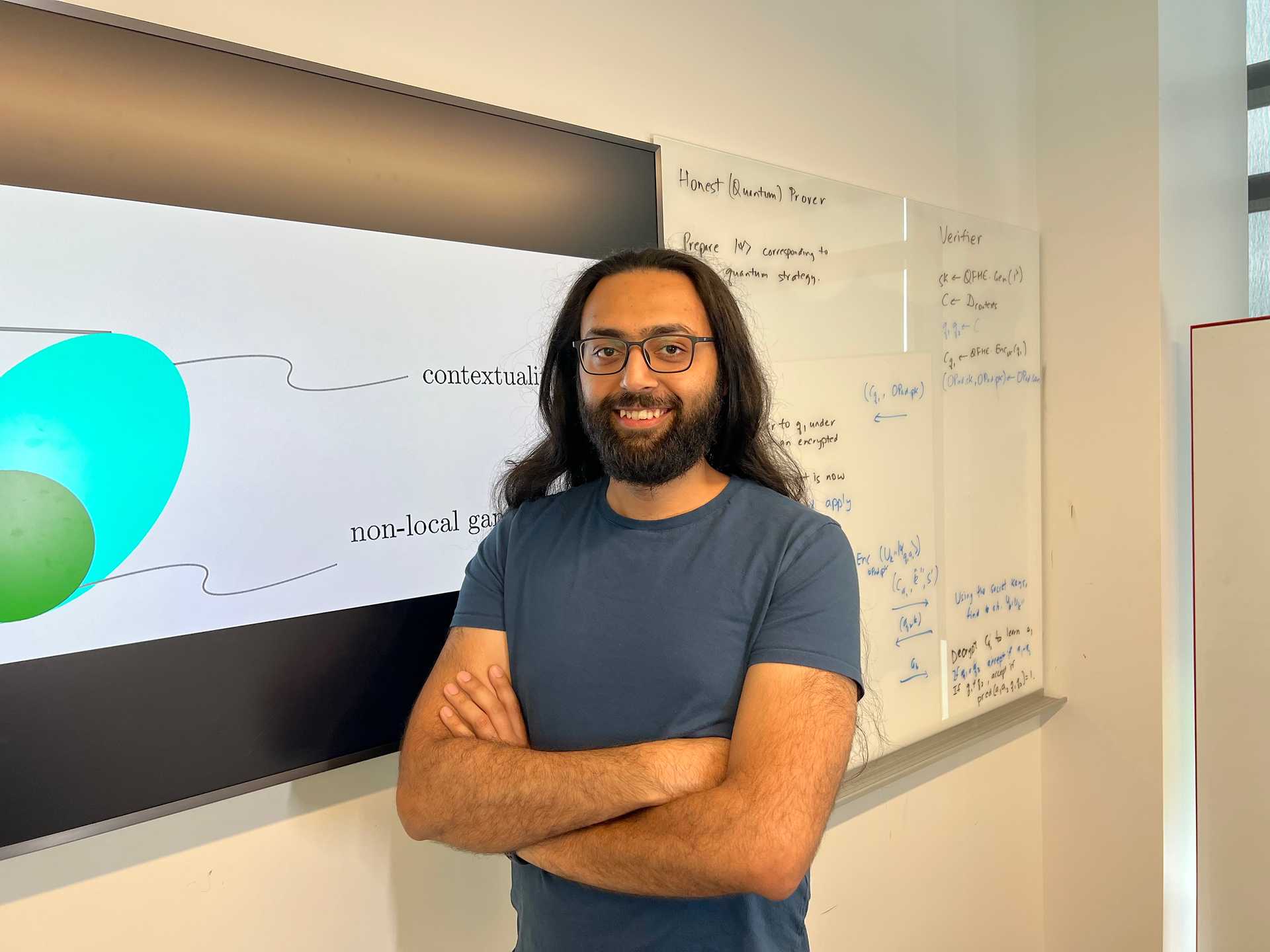Hartree Fellow Uses Cryptography to Test Quantum Physics
September 6, 2024
Researchers at the leading edge of quantum computation and cryptography are exploring how hybrid systems—a blend of classical and quantum computing—can overcome current limitations and shed light on the foundational principles of quantum mechanics. This innovative approach is redefining what’s possible—both in cryptographic applications and in our understanding of the quantum world.
Atul Singh Arora, who arrived at the University of Maryland last year as a Hartree Postdoctoral Fellow, is focused on unraveling the mysteries of quantum computational complexity, cryptography and their foundational implications.
Working with others in the Joint Center for Quantum Information and Computer Science (QuICS), which supports his fellowship, Arora developed methods to verify quantum circuits, demonstrating that efficient classical computers paired with simple quantum circuits can outperform purely classical systems. This work was presented at the 55th Annual ACM Symposium on Theory of Computing in June 2023.
He is now investigating how quantum resources can enhance security for cryptographic tasks, specifically in device-independent and secure multi-party computation settings. Arora has prior experience with this topic through his doctoral work, having developed new protocols that achieve near perfect security for weak coin flipping, a problem in the multi-party setting that had remained unsolved since 2008.
His interest in quantum science began during his undergraduate studies in physics at the Indian Institute of Science Education and Research (IISER) in Mohali, India. A lecture on quantum information sparked his curiosity, leading him to a career that merges the precision of computer science with the profound questions of physics.
“I was captivated by breakthroughs like quantum key distribution and factoring integers,” Arora says. “Over time, I've come to appreciate the complexities of quantifying quantum power, achieving new cryptographic tasks, and using cryptographic ideas to explore physical questions.”
He earned a master’s degree in physics from IISER before completing his Ph.D. in engineering sciences and technology at the Université libre de Bruxelles in Belgium in 2020. After pursuing a postdoctoral fellowship at the California Institute of Technology, Arora joined QuICS, where he has collaborated with several QuICS Fellows including Matthew Coudron and Alexey Gorshkov, who notes Arora’s exceptional problem-solving skills.
“I love working with Atul,” Gorhskov says. “Whenever we are stuck, it is often his creative ideas that allow us to move forward.”
Recently, Arora has been collaborating with QuICS alumni postdoctoral scholars Kishor Bharti and Alexandru Cojocaru to explore how cryptographic ideas can address fundamental questions in quantum mechanics.
Traditionally, “non-local” experiments involve physically separating participants so they cannot communicate, which helps reveal the differences between quantum and classical theories. A generalization of these experiments known as contextuality experiments, show an even stronger gap between quantum and classical theories. However, for the latter, there is no simple way of enforcing the analogue of physical separation.
Arora and his team have created a novel method to enforce this assumption with cryptographic methods. Using cryptography allows them to test a physical idea that we have no other way of satisfactorily testing. Using these ideas, they are also able to construct more practical tests that certify that a device is quantum.
The team’s paper on this significant breakthrough will be presented next month at the 65th IEEE Symposium on Foundations of Computer Science (FOCS) in Chicago.
QuICS Fellow Andrew Childs, who has also worked with Arora, spoke to the value of the work that was submitted to the FOCS symposium.
“The work by Atul and his co-authors on testing contextuality is an exciting application of cryptography to the foundations of quantum physics,” Childs says. “It takes a counterintuitive feature of quantum mechanics that doesn't seem possible to test in practice and finds a way to make it not only testable, but useful for establishing quantum computational power.”
Arora states that his time at QuICS has been highly productive, with the center’s collaborative environment playing a crucial role in advancing his research. He credits much of his progress to the support and insight of his colleagues.
“Everyone I've worked with has helped me by pointing out gaps in my reasoning, suggesting alternatives, and bringing energy and enthusiasm, which is crucial when things don’t work,” Arora says. “Their diligence and dedication to science have made the journey meaningful, as we've shared the highs, lows, and everything in between.”
As he prepares to start his new role this December as an assistant professor at the International Institute of Information Technology, Hyderabad, Arora is eager to continue his research in quantum foundations, computational complexity and cryptography.
“I’m looking forward to pursuing my interests in quantum theory further, especially in an academic setting where I can continue to push the boundaries of what we understand about the quantum world,” he says.
—Story by Melissa Brachfeld, UMIACS communications group
About the Hartree Fellowship
QuICS offers two-year Hartree Fellowships to exceptional candidates interested in quantum information science and quantum computing. The fellowship is named for Douglas Hartree, a scientist at the National Institute of Standards and Technology (NIST) in the mid-1900s who made substantial contributions to physics and computer science.
About QuICS
QuICS is a partnership between the University of Maryland and NIST. Located just outside of Washington, D.C. on the UMD campus, the center advances research and education in quantum computer science and quantum information theory. QuICS receives its technical and administrative support from the University of Maryland Institute for Advanced Computer Studies.